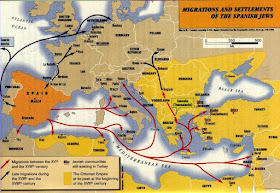In a year most remembered for Christopher Columbus’s discovery of the New World, the Spanish monarchs were also making history at home. In March 1492, Ferdinand V and Isabella I of Spain issued the Alhambra Decree, which ordered the expulsion of all Jewish men and women from the newly united kingdom.
Also known as the Edict of Expulsion, this decree gave the Jews four months to depart and forbade their return to Spain. Those who did not comply with the decree would be stripped of all belongings and put to death.
Traditional accounts of the expulsion contend that as many as 400,000 Jews fled to North Africa and Turkey in response to this decree. Recent scholarship has challenged this account and reduces the number of refugees to a total of 30,000–40,000, with only 10,000 fleeing to Turkey from the western provinces.
  |
The remaining refugees from Spain fled overland to neighboring Portugal, where tensions were already growing between the native Christian and Jewish populations. The addition of 20,000 Jewish refugees led to increased persecution, and just four years after the Alhambra Decree was issued in Spain, King Manuel of Portugal followed suit by ordering the expulsion of all Jews residing within the borders of his kingdom.
Hoping to avoid the logistical problems of the Spanish expulsion, Manuel gave the Jewish community 10 months to prepare, moving the actual date of expulsion to October 1497. In the interim, many of the Jews chose to convert to Christianity to avoid the treacherous journey across the Mediterranean.
The Spanish refugees were also able to return to their homeland as “new Christians” if they were willing to convert. The small number of Jews unwilling to make this sacrifice had no choice but to travel across the Mediterranean to North Africa. It is most likely these Jews, expelled from Portugal and not Spain, made up the first population of Sephardic Jews in North Africa.
The expulsion of the Jews from Spain has been a subject of great historical interest, and numerous scholars have weighed in with varying accounts of the causes, processes, and consequences of this event. All agree that the expulsion was the inevitable result of the Spanish Inquisition, instituted by Ferdinand and Isabella in 1478.
 |
| Jews migration map |
Traditional theories hold that the Inquisition was created to combat the growing number of Jewish converts (conversos), who were thought to be practicing Jewish rituals in secret. According to this approach, the expulsion was an attempt to rid the kingdom of genuine Jews, who were assumed to be a bad influence on the conversos.
Revisionist historians have challenged this account of the expulsion in one of two ways. Some have argued that the conversos were genuine converts to Christianity and that the Inquisition against them was instituted to undermine their economic and political success. According to this theory, the expulsion was an unintended consequence of an Inquisition that had gained its own inertia among the populace.
Others have argued that the Inquisition was largely a political institution instituted to secure the religious unity of the newly united Spanish kingdom. On this account, the expulsion was actually less about removing the Jews from the kingdom than it was about forcing them to convert to Christianity by default. The historical events leading to the expulsion of the Jews from Portugal are less enigmatic.
   |
As was mentioned, tensions had been rising between Jews and Christians within Portugal for some time. In fact, King João II was considering an expulsion as early as 1493. After João’s death in 1495, the situation of the Jews improved for a brief period under the reign of Manuel.
Yet, all hope was crushed when the Spanish Crown interfered, pressuring Manuel to expel his own Jews for the sake of greater Christendom. Ferdinand and Isabella were able to force this second expulsion because Manuel was intent upon marrying their daughter, Isabella.
This marriage was an important political move for Portugal, and Ferdinand and Isabella made the expulsion of Portuguese Jews a necessary condition of the marriage contract. Thus, despite his unease over the expulsion, Manuel issued his decree in 1496.
